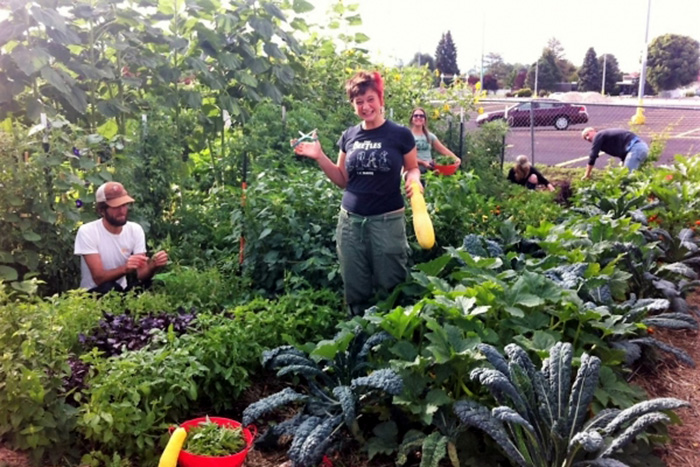Benefits of Community Gardens
Community gardens have gained popularity in recent years as people recognize the numerous benefits they offer. In this article, we will explore the advantages of community gardens and how they can positively impact individuals and communities.
Improved Access to Fresh Produce
One of the key benefits of community gardens is the increased access to fresh produce. Many urban areas lack green spaces and grocery stores that offer fresh, locally grown fruits and vegetables. Community gardens fill this gap by providing a space where individuals can grow their own food. This not only ensures a regular supply of fresh produce but also promotes healthier eating habits.
Enhanced Community Bonding
Community gardens foster a sense of togetherness and unity among participants. People from diverse backgrounds come together to work towards a common goal – creating a beautiful and productive garden. This shared experience creates opportunities for social interaction, collaboration, and the formation of lasting friendships. Community gardens act as a catalyst for building stronger and more connected communities.
Environmental Benefits
Community gardens contribute to a healthier environment in several ways. Firstly, they promote sustainable practices such as composting, rainwater harvesting, and organic gardening techniques. This reduces the reliance on chemical pesticides and fertilizers, leading to a decrease in environmental pollution. Additionally, community gardens help combat urban heat islands by providing shade and reducing surface temperatures. They also contribute to improved air quality by absorbing carbon dioxide and releasing oxygen.
Physical and Mental Health Benefits
Engaging in community gardening has numerous positive effects on both physical and mental health. Gardening is a form of physical activity that helps individuals stay active and maintain a healthy lifestyle. It can improve cardiovascular health, strengthen muscles, and enhance flexibility. Moreover, spending time in nature and being exposed to sunlight can boost vitamin D levels and improve overall well-being.
Community gardens also offer therapeutic benefits. Gardening has been shown to reduce stress, anxiety, and depression. It provides a sense of purpose, accomplishment, and connection with nature. The act of nurturing plants and watching them grow can be immensely rewarding and uplifting.
Educational Opportunities
Community gardens serve as valuable educational resources for both children and adults. They provide a hands-on learning experience where individuals can develop skills in gardening, sustainable practices, and food production. Children can learn about plant life cycles, healthy eating habits, and environmental stewardship. Community gardens often organize workshops, seminars, and gardening classes to further enhance the learning opportunities available.

Community gardens offer a multitude of benefits ranging from improved access to fresh produce and enhanced community bonding to environmental sustainability and better physical and mental health. Engaging in community gardening not only enriches individuals’ lives but also contributes to the overall well-being of communities. By supporting and participating in community gardens, we can create a healthier, more connected, and sustainable future.
Frequently Asked Questions – Benefits of Community Gardens
1. What are community gardens?
Community gardens are shared spaces where individuals come together to cultivate and grow plants, vegetables, and flowers collectively.
2. What are the benefits of community gardens?
Community gardens offer numerous benefits, such as:
Promoting social interaction and community bonding
Improving access to fresh and nutritious produce
Enhancing mental and physical well-being through outdoor activities
Creating opportunities for education and skill development
Encouraging sustainable and eco-friendly practices
3. How do community gardens promote social interaction?
Community gardens bring people from diverse backgrounds together, fostering social connections, collaboration, and a sense of belonging within the community.
4. How do community gardens improve access to fresh produce?
By growing their own fruits and vegetables, community gardeners have easy access to nutritious, organic produce that may otherwise be expensive or hard to find in their neighborhood.
5. How do community gardens enhance mental and physical well-being?
Gardening activities help reduce stress, improve mood, and provide physical exercise, leading to improved mental and physical health for participants.
6. How do community gardens offer educational opportunities?
Community gardens often organize workshops, classes, and demonstrations on gardening techniques, environmental sustainability, and healthy eating, providing valuable educational experiences for participants of all ages.
7. How do community gardens encourage sustainable practices?
Community gardens promote sustainable practices by utilizing organic gardening methods, composting, rainwater harvesting, and recycling, reducing the environmental impact of food production.
8. Can anyone participate in a community garden?
Yes, community gardens are open to all individuals, regardless of age, background, or gardening experience. They encourage inclusivity and welcome anyone interested in gardening and community involvement.
9. Are community gardens only for growing food?
No, while growing food is a primary focus, community gardens also serve as green spaces for relaxation, beautification, and cultivating flowers or ornamental plants.
10. How can I get involved in a community garden?
You can get involved in a community garden by reaching out to local gardening associations, community centers, or city councils to find existing gardens or initiate the creation of a new one. Volunteering, attending meetings, and contributing your time and skills are great ways to participate.




